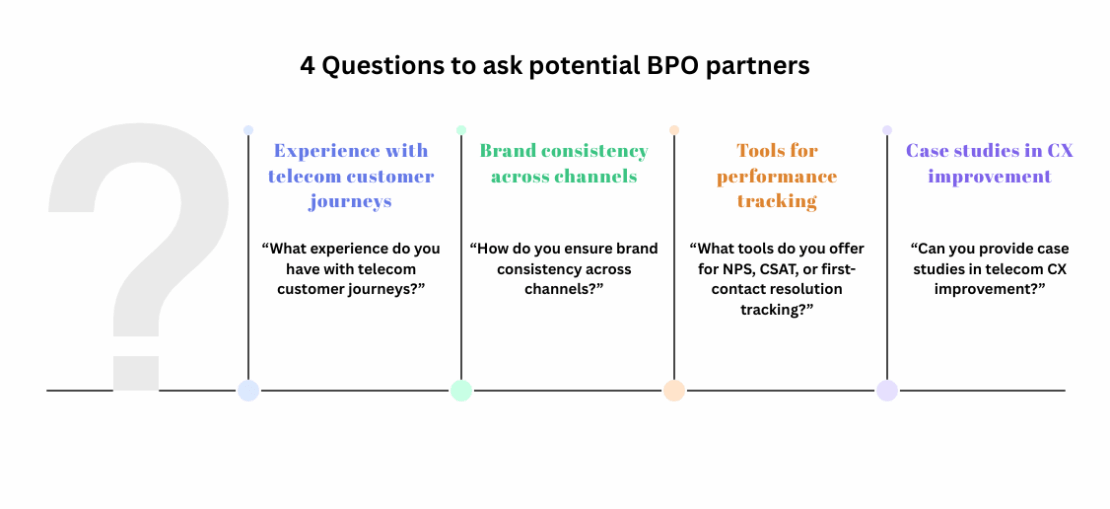Read Time: 8 minutes
Table of Contents
Introduction
Today’s telecom market is fairly saturated, which results in products and their pricing becoming increasingly commoditized. As such, the customer experience (CX) has become one place where companies can truly differentiate themselves. Telecom companies tend to operate in environments with high volumes of calls and high expectations, meaning that long wait times or dropped calls can quickly result in customer churn. Outsourcing your CX is a great way to tackle those high volumes and expectations without burning out your internal staff, but choosing the wrong BPO partner can turn that strategic advantage into a massive failure. For any telecom company decision-makers who are weighing their outsourcing options, the decision isn’t merely a cost-based one, but a conscious effort to understand the inherent complexities of the telecom customer journey, while gaining greater flexibility in operations, and fostering brand loyalty at a larger scale.
Key takeaways
- Generic support doesn’t cut it: Telecom CX success is increasingly dependent on specialized, agile outsourcing support.
- BPO partners need to be aligned with telecom needs and goals: Misaligned BPO partners contribute to inconsistent service delivery and customer churn. Real-time metrics and cultural alignment drive long-term telecom CX outcomes.
- What to prioritize in a partner: Choosing the right outsourcing provider means prioritizing industry-specific expertise, omnichannel capabilities, and data integration.

Where telecom customer experience fails with the wrong BPO partner
Telecom providers sometimes choose the wrong outsourcing partner, and when they do, it can easily result in customer churn, low satisfaction, and a blow to the company’s operations. Here are some of the most common ways that your CX efforts can take a hit with the wrong BPO provider.
Generic support that lacks industry context
Telecom customers, like most consumers, are on the hunt for fast, knowledgeable responses, especially when they are faced with a current outage, a question about billing, or are looking to upgrade their plan. Support teams with generic, one-size-fits-all training that doesn’t touch on anything telecom-specific are likely to fail, fumbling with your customers’ technical issues, and causing frustration at times when your customers need help the most.
Inflexible processes that can’t scale with telecom demands
The needs of telecom customers can rapidly shift, especially during volatile times like peak usage periods, network upgrades, or product launches. When a BPO’s staffing models and workflows are too rigid, it can make it difficult or even impossible for them to keep up with those shifting needs, ultimately leading to long hold times, scaling problems, and reactive service instead of proactive care.
Poor omnichannel integration
With modern telecom, it only makes sense to design the user experience in such a way that allows for seamless transitions across channels and devices. When your support system is fragmented, it creates an inconsistent, disjointed experience for your customers, leading them to repeat themselves for multiple agents, greatly slowing down the process. The wrong BPO, in this case, can quickly leave your customers feeling frustrated and unheard, leading to a poor customer sentiment.
Want to scale your business?
Global Response has a long track record of success in outsourcing customer service and call center operations. See what our team can do for you!
Misaligned KPIs and quality assurance gaps
An outsourcing partner who tracks the wrong metrics (or worse yet, no metrics) is doing you a disservice. When you and your BPO partner don’t have a strong QA framework in place and a shared vision for your goals and the metrics that measure them, your CX can pay the price.
Cultural mismatch and training challenges
When a BPO partner doesn’t understand your brand’s tone and customer base, it will be reflected in the customer experience. Lack of cultural alignment and weak onboarding result in stiff interactions that make your customers feel disconnected and erode their trust in your brand, especially in such a people-driven industry like telecom.
Characteristics of the right telecom CX outsourcing partner
The correct BPO partner will ideally become an extension of your brand, not some slapdash, tacked-on solution. Here’s what to look for in a BPO that’s built for telecom.
Deep telecom domain expertise
Outsourcing partners need a good understanding of the telecom landscape, everything from it’s its regulations, the complexity of its products, how telecom billing systems operate, and the most common customer pain points. Telecom domain expertise gives rise to faster resolution times, higher compliance rates, and an overall smoother customer journey.
Proven omnichannel support models
Keep your eye out for providers with a proven record of successfully handling voice, email, chat, SMS, and social in a unified way. Those seamless handoffs and consistent brand messaging across all communication channels are crucial for retaining high customer satisfaction.
Real-time analytics and transparency
The best telecom BPO partners should offer full transparency and insights through real-time dashboards, VoC, and reporting tools. The analytics and insights gained from these tools ensure that you’re never left wondering about your performance. Full transparency will allow you to trust your partner and provide the opportunity for quick course-correction when needed.
Flexible contracts and service models
Telecom is a dynamic industry, so it only makes sense that your BPO partner is flexible too. Choose BPOs that support volume fluctuations, allow you to integrate new tech, and change up your service offerings without unnecessary friction.
Collaborative onboarding and cultural alignment
The most effective partnerships begin with very intentional onboarding, where your BPO partner invests significant time into understanding your brand voice, your company’s values, and your short and long-term CX goals, using those insights to train agents to fully embody that ethos during every customer interaction.

Evaluating potential BPOs: Questions telecom decision-makers should ask
Finding the best BPO partner for your telecom brand begins with the right questions. Here are some informative questions you can ask potential partners to gauge how well they fit your telecom needs.
- What experience do you have with telecom customer journeys?
- Partners who have a good track record in the telecom industry will naturally have a strong understanding of the most common pain points and customer behaviors to look out for, as well as the most important telecom industry-specific compliance needs.
- How do you ensure brand consistency across channels?
- Ideally, your partner should have a well-structured QA process, comprehensive customer service training, and excellent omnichannel scripting that reflects well on your brand’s voice and values across all channels.
- What tools do you offer for NPS, CSAT, or first-contact resolution tracking?
- Tracking your performance isn’t only about call volumes. A good telecom partner will help you measure important KPIs like customer sentiment in real time, giving you what you need to improve and adapt the CX.
- Can you provide case studies in telecom CX improvement?
- When a potential partner can substantiate their promises with real-world results, it can speak volumes about what they are capable of. Ask prospective BPOs for examples and case studies that show how they were able to improve CX metrics, scale service, or drive retention for other telecom brands.
The future of telecom customer experience: Partnering for transformation
Like many industries, telecom is in the midst of a transformation, which is powered by AI, predictive analytics, and conversational intelligence.
However, even the latest and greatest tech is only effective in the hands of the right humans, beholden to the right processes.
As time marches forward, only BPOs that blend the advantages of automated tools with the emotional intelligence of experienced agents will reap the rewards of greater CX and customer loyalty.
Conclusion
Telecom businesses who choose the wrong outsourcing partners will quickly see how severely the wrong partner can derail the whole of their customer experience. With that comes customer churn, bad reviews, and a major strain on their internal operations. However, with the right BPO partner at the helm, operating with telecom expertise, smooth omnichannel communication, and a collaboration-first mindset, telecom companies can see incredible long-term growth.
To make the best choice, it’s vital for telecom decision-makers to look past the surface of BPO pitches, asking the tough questions of prospective partners and demanding transparency and proven telecom performance from their vendor of choice.




